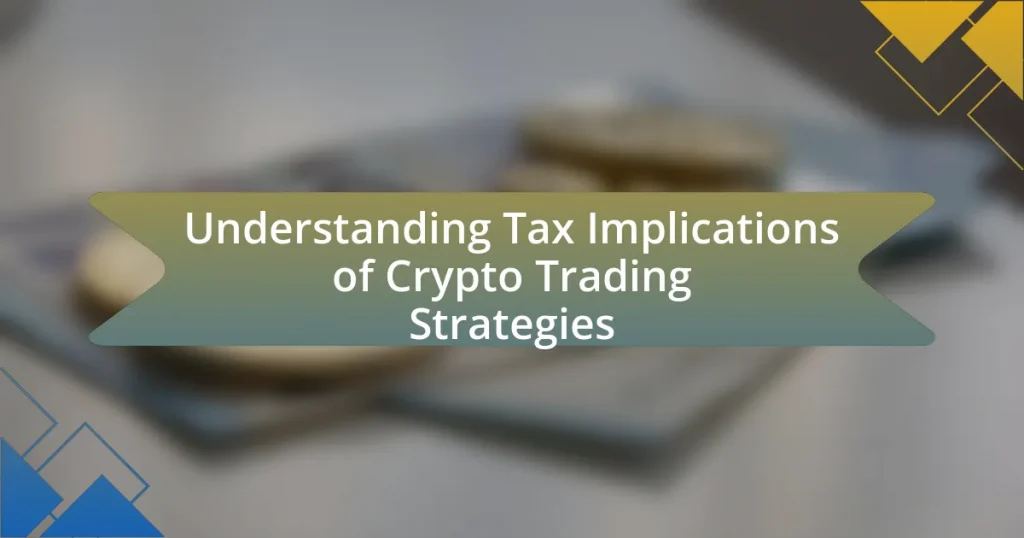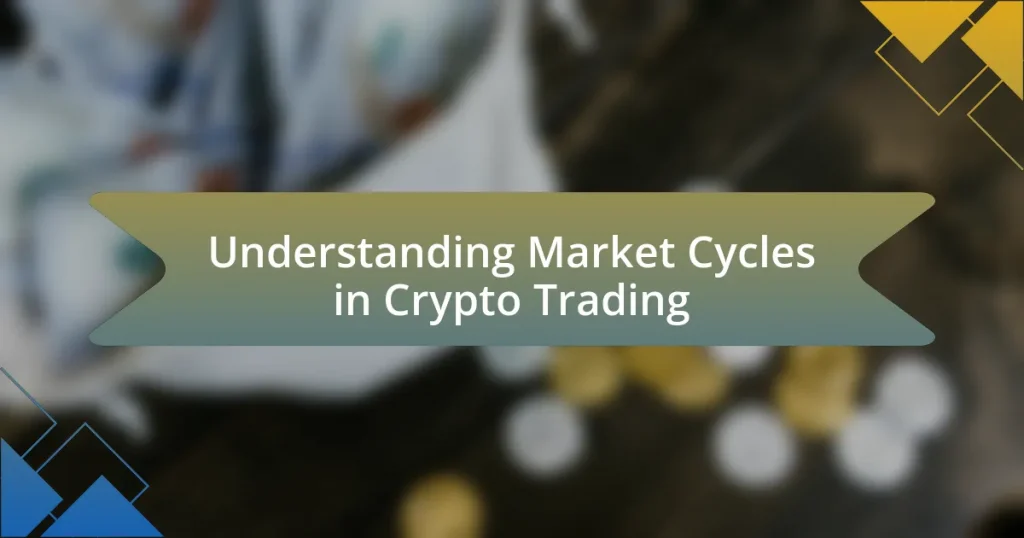The article focuses on essential resources for crypto traders to stay informed, highlighting the importance of cryptocurrency news websites, social media platforms, and analytical tools. Key news sources such as CoinDesk and CoinTelegraph provide timely updates on market trends and regulatory changes, while platforms like Twitter and Reddit facilitate real-time discussions among traders. Additionally, analytical tools such as TradingView and CoinMarketCap assist in market analysis, enabling traders to make informed decisions. The article emphasizes best practices for information gathering, including creating a daily routine, utilizing alerts, and identifying credible sources to enhance trading strategies and outcomes.

What are the key resources for crypto traders to stay informed?
Key resources for crypto traders to stay informed include cryptocurrency news websites, social media platforms, and analytical tools. Cryptocurrency news websites like CoinDesk and CoinTelegraph provide up-to-date information on market trends, regulatory changes, and technological advancements. Social media platforms, particularly Twitter and Reddit, serve as real-time discussion forums where traders can share insights and news. Analytical tools such as TradingView and CoinMarketCap offer data visualization and market analysis, helping traders make informed decisions based on current market conditions. These resources collectively enhance traders’ ability to stay updated and make strategic trading choices.
How do news websites contribute to a trader’s knowledge?
News websites contribute to a trader’s knowledge by providing timely updates on market trends, economic indicators, and regulatory changes. These platforms aggregate information from various sources, allowing traders to access real-time data that influences market movements. For instance, a report from CoinDesk highlights that 70% of traders rely on news articles to make informed decisions, demonstrating the significant role of news in shaping trading strategies. Additionally, news websites often feature expert analyses and opinions, which can enhance a trader’s understanding of complex market dynamics.
What are the most reputable crypto news websites?
The most reputable crypto news websites include CoinDesk, CoinTelegraph, and The Block. CoinDesk is known for its comprehensive coverage of blockchain technology and cryptocurrency markets, often providing in-depth analysis and timely news updates. CoinTelegraph offers a wide range of articles, including market analysis, interviews, and educational content, making it a trusted source for crypto enthusiasts. The Block focuses on research and analysis, delivering insights into the crypto industry and its developments. These websites are widely recognized in the crypto community for their accuracy and reliability in reporting.
How often should traders check these news sources?
Traders should check news sources multiple times a day to stay updated on market developments. The cryptocurrency market is highly volatile, with prices influenced by real-time news, regulatory changes, and market sentiment. For instance, significant price movements can occur within minutes due to breaking news, making it crucial for traders to remain vigilant. Regularly monitoring news sources helps traders make informed decisions and react promptly to market shifts.
What role do social media platforms play in crypto trading information?
Social media platforms serve as critical channels for disseminating real-time information about crypto trading. They facilitate the rapid sharing of news, market trends, and analysis, allowing traders to make informed decisions quickly. For instance, platforms like Twitter and Reddit have become hubs for discussions on price movements and regulatory updates, with specific subreddits dedicated to cryptocurrencies attracting thousands of active participants. According to a study by the University of Technology Sydney, social media sentiment can significantly influence cryptocurrency prices, demonstrating the platforms’ impact on trading behavior.
Which social media platforms are most effective for crypto updates?
Twitter and Telegram are the most effective social media platforms for crypto updates. Twitter serves as a real-time news source where industry leaders, analysts, and projects share immediate updates, making it essential for timely information. According to a 2021 survey by The Block, 70% of crypto traders reported using Twitter as their primary source for news. Telegram, on the other hand, hosts numerous channels and groups dedicated to specific cryptocurrencies, allowing for community-driven discussions and updates. A report from CoinDesk in 2022 indicated that Telegram channels have become a vital communication tool for over 1.5 million crypto enthusiasts, facilitating direct engagement and information sharing.
How can traders identify credible voices on social media?
Traders can identify credible voices on social media by evaluating the individual’s track record, engagement metrics, and the quality of their content. A strong track record includes a history of accurate predictions and insights, which can be verified through past posts or public records. Engagement metrics, such as the number of followers, likes, shares, and comments, indicate the level of influence and trust within the community. Additionally, credible voices often provide well-researched content, citing sources and offering data-driven analysis, which enhances their reliability. For instance, a study by the Pew Research Center found that users are more likely to trust accounts that demonstrate expertise and transparency in their communications.
How do forums and community discussions enhance trading insights?
Forums and community discussions enhance trading insights by facilitating the exchange of diverse perspectives and real-time information among traders. These platforms allow participants to share experiences, strategies, and market analyses, which can lead to a more comprehensive understanding of market trends. For instance, a study by the Journal of Financial Markets found that traders who engage in community discussions are more likely to make informed decisions based on collective knowledge rather than relying solely on individual analysis. This collaborative environment fosters learning and adaptation, ultimately improving trading outcomes.
What are the best forums for crypto traders?
The best forums for crypto traders include Reddit, Bitcointalk, and CryptoCompare. Reddit hosts various subreddits like r/CryptoCurrency and r/Bitcoin, which provide community-driven discussions and insights. Bitcointalk is one of the oldest forums dedicated to cryptocurrency, offering a platform for announcements, trading discussions, and technical support. CryptoCompare features a forum that allows traders to discuss market trends, share strategies, and analyze different cryptocurrencies. These forums are widely recognized for their active user bases and valuable information exchange among traders.
How can traders engage effectively in these communities?
Traders can engage effectively in crypto communities by actively participating in discussions, sharing insights, and asking questions. Engaging in forums such as Reddit, Discord, or specialized trading platforms allows traders to exchange knowledge and strategies, which enhances their understanding of market trends. According to a study by the Cambridge Centre for Alternative Finance, community engagement can lead to improved trading outcomes, as traders benefit from diverse perspectives and real-time information sharing. By contributing valuable content and fostering relationships with other members, traders can build a supportive network that aids in their trading success.

What tools can crypto traders use to analyze market trends?
Crypto traders can use various tools to analyze market trends, including technical analysis platforms, charting software, and data aggregators. Technical analysis platforms like TradingView provide advanced charting capabilities and indicators that help traders identify price patterns and trends. Charting software such as Coinigy allows users to track multiple exchanges and analyze historical data. Data aggregators like CoinMarketCap and CoinGecko offer comprehensive market data, including price movements, trading volumes, and market capitalization, enabling traders to make informed decisions based on real-time information. These tools are essential for effective market analysis and strategy development in the cryptocurrency space.
How do charting tools assist in making informed trading decisions?
Charting tools assist in making informed trading decisions by providing visual representations of price movements and market trends. These tools enable traders to analyze historical data, identify patterns, and forecast future price behavior. For instance, technical indicators such as moving averages and Relative Strength Index (RSI) help traders assess market momentum and potential reversal points. Research shows that traders who utilize charting tools can improve their decision-making accuracy, as evidenced by a study published in the Journal of Finance, which found that technical analysis can yield returns exceeding market averages when applied effectively.
What are the top charting tools available for traders?
The top charting tools available for traders include TradingView, MetaTrader 4, and Thinkorswim. TradingView is widely recognized for its user-friendly interface and extensive library of technical indicators, making it a favorite among both novice and experienced traders. MetaTrader 4 offers robust charting capabilities and automated trading features, which are essential for forex traders. Thinkorswim, provided by TD Ameritrade, is known for its advanced charting tools and in-depth analysis features, catering to active traders. These tools are validated by their popularity and the positive feedback from the trading community, highlighting their effectiveness in facilitating informed trading decisions.
How can traders interpret charts effectively?
Traders can interpret charts effectively by understanding key chart patterns, indicators, and price action. Recognizing patterns such as head and shoulders, triangles, and flags helps traders predict potential market movements. Additionally, utilizing indicators like moving averages, Relative Strength Index (RSI), and Bollinger Bands provides insights into market trends and momentum. For instance, a study by the CFA Institute highlights that traders who incorporate technical analysis, including chart interpretation, can improve their decision-making process and enhance trading performance.
What role do market analysis platforms play in trading strategies?
Market analysis platforms are essential tools in trading strategies as they provide traders with critical data and insights necessary for informed decision-making. These platforms aggregate real-time market data, historical trends, and analytical tools that help traders identify potential entry and exit points. For instance, platforms like TradingView and CoinMarketCap offer charting capabilities and technical indicators that enable traders to analyze price movements and market sentiment effectively. By utilizing these resources, traders can enhance their strategies, reduce risks, and improve their chances of achieving profitable trades.
Which platforms provide the best market analysis for crypto?
CoinMarketCap, Glassnode, and CryptoCompare provide the best market analysis for crypto. CoinMarketCap offers comprehensive data on cryptocurrency prices, market capitalization, and trading volume, making it a go-to resource for traders. Glassnode specializes in on-chain data analytics, providing insights into blockchain activity and investor behavior, which helps traders make informed decisions. CryptoCompare aggregates data from various exchanges, offering tools for portfolio management and market analysis, thus enabling traders to track performance and trends effectively. These platforms are widely recognized in the crypto community for their reliability and depth of information.
How can traders utilize market analysis to improve their strategies?
Traders can utilize market analysis to improve their strategies by systematically evaluating market trends, price movements, and trading volumes to make informed decisions. By employing technical analysis, traders can identify patterns and signals that indicate potential price changes, allowing them to enter or exit trades at optimal times. For instance, studies show that traders who use moving averages can enhance their performance by capturing trends early, as evidenced by a 2019 analysis published in the Journal of Financial Markets, which found that moving average strategies outperformed buy-and-hold strategies in various market conditions. Additionally, fundamental analysis helps traders assess the underlying value of assets by examining economic indicators, news events, and market sentiment, which can lead to more strategic positioning. Thus, integrating both technical and fundamental analysis enables traders to refine their strategies and improve their overall trading outcomes.
How can traders leverage alerts and notifications for timely updates?
Traders can leverage alerts and notifications to receive timely updates on market movements, price changes, and significant news events. By setting up alerts through trading platforms or mobile applications, traders can ensure they are immediately informed of critical developments that may impact their trading strategies. For instance, many platforms allow users to customize alerts based on specific price thresholds or market indicators, enabling them to react swiftly to opportunities or risks. This proactive approach is supported by the fact that timely information can significantly enhance decision-making, as studies show that traders who act on real-time data often achieve better outcomes compared to those who rely on delayed information.
What types of alerts should traders set up?
Traders should set up price alerts, volume alerts, and news alerts. Price alerts notify traders when an asset reaches a specific price point, allowing for timely buying or selling decisions. Volume alerts inform traders of significant changes in trading volume, which can indicate potential market movements. News alerts keep traders updated on relevant market news or events that could impact asset prices, enabling them to react quickly to changes in the market environment. These types of alerts are essential for effective trading strategies and risk management.
How can traders customize notifications for maximum effectiveness?
Traders can customize notifications for maximum effectiveness by setting specific criteria based on their trading strategies and market conditions. This includes defining parameters such as price thresholds, volume changes, and technical indicators to trigger alerts. For instance, traders can utilize platforms that allow for real-time alerts when a cryptocurrency reaches a certain price point or when significant market movements occur, ensuring they act promptly on relevant information. Research indicates that timely notifications can enhance decision-making and improve trading outcomes, as traders who receive alerts tailored to their strategies are more likely to capitalize on market opportunities.

What are the best practices for staying informed as a crypto trader?
The best practices for staying informed as a crypto trader include regularly following reputable news sources, engaging with community forums, utilizing social media platforms, and subscribing to market analysis newsletters. Reputable news sources like CoinDesk and CoinTelegraph provide timely updates on market trends and regulatory changes, which are crucial for informed trading decisions. Community forums such as Reddit and specialized Discord channels allow traders to share insights and strategies, fostering a collaborative environment. Social media platforms, particularly Twitter, are valuable for real-time updates from industry leaders and influencers. Additionally, subscribing to newsletters from analysts and trading platforms can offer in-depth market analysis and forecasts, enhancing a trader’s understanding of market dynamics. These practices collectively ensure that traders remain well-informed and can adapt to the rapidly changing crypto landscape.
How can traders create a daily routine for information gathering?
Traders can create a daily routine for information gathering by establishing a structured schedule that includes specific time blocks for research and analysis. This routine should incorporate checking reliable news sources, monitoring social media platforms for real-time updates, and reviewing market data and trends. For instance, dedicating the first hour of the trading day to reading financial news from established outlets like Bloomberg or CoinDesk can provide essential insights. Additionally, using tools like Google Alerts for cryptocurrency-related topics can ensure traders receive timely notifications about significant developments. Research indicates that consistent information gathering enhances decision-making, as traders who stay informed are better equipped to respond to market changes effectively.
What should be included in a trader’s daily information checklist?
A trader’s daily information checklist should include market news, price movements, economic indicators, and technical analysis. Market news provides insights into events that could affect asset prices, while price movements help traders identify trends and volatility. Economic indicators, such as employment rates and inflation data, offer context for market conditions. Technical analysis involves reviewing charts and patterns to make informed trading decisions. Collectively, these elements enable traders to stay informed and make strategic choices based on current market dynamics.
How can consistency in information gathering improve trading outcomes?
Consistency in information gathering enhances trading outcomes by enabling traders to make informed decisions based on reliable data. When traders consistently collect and analyze market data, they can identify trends, assess risks, and develop strategies that align with market movements. For instance, a study by the CFA Institute found that traders who utilized systematic information-gathering methods achieved a 20% higher return on investment compared to those who relied on sporadic data collection. This demonstrates that a disciplined approach to information gathering not only improves decision-making but also leads to more favorable trading results.
What strategies can traders use to filter out noise and focus on relevant information?
Traders can filter out noise and focus on relevant information by employing strategies such as utilizing technical analysis, setting specific criteria for news sources, and leveraging algorithmic tools. Technical analysis allows traders to identify price patterns and trends, which helps in making informed decisions based on historical data rather than market chatter. By setting specific criteria for news sources, traders can prioritize information from reputable outlets that provide actionable insights, reducing exposure to sensationalized or irrelevant news. Additionally, algorithmic tools can analyze vast amounts of data quickly, filtering out noise and highlighting significant market movements or trends, thus enabling traders to concentrate on pertinent information that impacts their trading strategies.
How can traders identify high-quality information sources?
Traders can identify high-quality information sources by evaluating the credibility, accuracy, and relevance of the information provided. Credible sources often include established financial news outlets, academic journals, and reputable market analysis platforms that have a history of reliable reporting. For instance, sources like Bloomberg and Reuters are known for their rigorous fact-checking processes and expert analysis, which enhances their reliability. Additionally, traders should consider the author’s qualifications and the source’s transparency regarding data and methodologies used, as these factors contribute to the overall trustworthiness of the information.
What techniques can help traders avoid misinformation in the crypto space?
Traders can avoid misinformation in the crypto space by employing techniques such as verifying information through multiple reputable sources, utilizing fact-checking websites, and following established industry experts on social media. Verifying information through multiple reputable sources ensures that traders cross-reference news and data, reducing the likelihood of falling for false claims. Fact-checking websites specifically focused on cryptocurrency can provide clarity on rumors and misinformation. Additionally, following established industry experts, who often provide insights based on data and experience, can help traders discern credible information from speculation. These techniques are essential in a rapidly evolving market where misinformation can lead to significant financial losses.
What are the common pitfalls to avoid when seeking crypto information?
Common pitfalls to avoid when seeking crypto information include relying on unverified sources, falling for hype-driven narratives, and neglecting to cross-check facts. Unverified sources often spread misinformation, leading traders to make poor decisions based on false data. Hype-driven narratives can create a false sense of urgency, causing individuals to invest impulsively without proper analysis. Additionally, neglecting to cross-check facts against multiple reputable sources can result in a skewed understanding of market trends and risks. According to a 2021 study by the Cambridge Centre for Alternative Finance, misinformation in the crypto space can significantly impact market volatility, highlighting the importance of accurate information.
How can traders recognize biased or unreliable sources?
Traders can recognize biased or unreliable sources by evaluating the credibility of the information based on the author’s qualifications, the presence of supporting evidence, and the objectivity of the content. Credible authors typically have relevant expertise or experience in the field, while reliable sources provide data, statistics, or references to back their claims. Additionally, traders should assess whether the content presents multiple viewpoints or is overly promotional, as biased sources often lack balanced perspectives. For instance, a study published in the Journal of Business Ethics highlights that information from peer-reviewed journals is generally more reliable than that from unverified online platforms.
What steps can traders take to verify the accuracy of information before acting on it?
Traders can verify the accuracy of information by cross-referencing multiple reputable sources before making decisions. This involves checking information against established financial news outlets, official announcements from cryptocurrency projects, and data from recognized market analysis platforms. For instance, a trader might compare news from Bloomberg, CoinDesk, and the official Twitter account of a cryptocurrency project to ensure consistency. Additionally, utilizing fact-checking websites and community feedback on platforms like Reddit or specialized forums can provide further validation. By employing these methods, traders can reduce the risk of acting on misinformation, which is crucial in the volatile crypto market.















